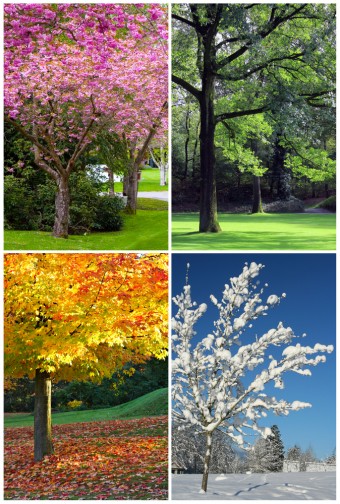Why We Call the Seasons Summer, Autumn, Winter, and Spring
 “Winter” derives from the Proto-Germanic *wentruz, meaning winter. This in turn probably comes from the Proto-Indo-European (PIE) *wed, meaning “wet”. Alternatively, it may come from the PIE *wind-, meaning “white”. Either way, the Proto-Germanic *wentruz gave rise to the Old English “winter” as the fourth season of the year and the name for the season has stuck around ever since.
“Winter” derives from the Proto-Germanic *wentruz, meaning winter. This in turn probably comes from the Proto-Indo-European (PIE) *wed, meaning “wet”. Alternatively, it may come from the PIE *wind-, meaning “white”. Either way, the Proto-Germanic *wentruz gave rise to the Old English “winter” as the fourth season of the year and the name for the season has stuck around ever since.
“Spring”, referring to a season rather than the many other meanings of the word, first popped up in the 16th century. Starting in the 14th century, this time of year was called “springing time” and then in the 15th century this got shortened to “spring-time”, and then further shortened in the 16th century to just “spring”. The 14th century “springing time” came about in reference to plants “springing” from the ground and the like. Before the season was called these things, it was called “Lent” in Old English.
“Summer” came from the Old English name for the season “sumor”, which in turn came from the Proto-Germanic *sumur-, which itself came from the Proto-Indo-European root *sam-, meaning summer. *sam- seems to be a variant of the Proto-Indo-European *sem- meaning “together / one”.
The origin of “fall” as a name for a season, rather than the more common “autumn”, is not perfectly clear, though it’s thought that it probably came from the idea of leaves falling from trees and many plants, particularly the contraction of the English saying “fall of the leaf”. It first popped up as a name for a season in the later 16th century in England and became particularly popular during the 17th century, at which point it made its way over to North America.
Funny enough, calling autumn “fall” in England has since passed out of widespread practice, but has survived as a common name for the season in North America. This is not unlike how “soccer” was originally one of the most popular names for the sport in England around its inception and a long time after, which spread to North America, only to have the name die out in England, leading many to believe “soccer” is an “American” name for the sport, rather than one of the original names for it in England. (For more on this see: The Origin of the Word “Soccer”.)
While you didn’t specifically ask it, you might now be wondering what the origin of “autumn” is. “Autumn” came to English via the Old French “autompne”, meaning autumn. This in turn came from the Latin “autumnus”, also meaning “autumn”. From here things get murky, but it’s thought “autumnus” probably came from an Etruscan word and is possibly related to the Latin “augere” meaning “to increase”. Beyond that, nobody is quite sure why the season was originally called that.
Calling the season “autumn” in English first popped up in the 12th century, though was a rarity until around the 14th century. It then began to pick up steam and became common in the 16th century, about the same time calling it “fall” popped up as the name for the season. Before calling the season “autumn” or “fall” in English, it was called “harvest”.
Incidentally, you may also wonder why the seasons are called “seasons”. The word “season” in this context comes from the Old French “seison”, meaning “sowing / planting”. This in turn came from the Latin “sationem” meaning “sowing”. Initially this referred to actually sowing seeds, but later, as with the Old French “seison”, shifted definition to refer to the time period when you sow seeds, so literally “seed-time”. “Season” in this sense in English popped up around the 13th century. It was also around this time that “season” popped up referring to seasoning food- in this case from the Old French “assaisoner”, meaning “to ripen”.
If you liked this article, you might also like:
- Why Humans Seem to Get Sick More in Winter
- Why the Late Part of the Summer is Known as the Dog Days
- Why Do Leaves Change Color in the Autumn
Bonus Facts:
- “Spring” as in “to leap” comes from the Proto-Germanic *sprenganan from the Proto-Indo-European *sprengh-, meaning “rapid movement”.
- “Spring”, as in a stream, first popped up around the 13th century. Like the “Spring” as in the season, this came from the idea of something “springing up”, in this case water springing from the ground.
| Share the Knowledge! |
|





3 comments